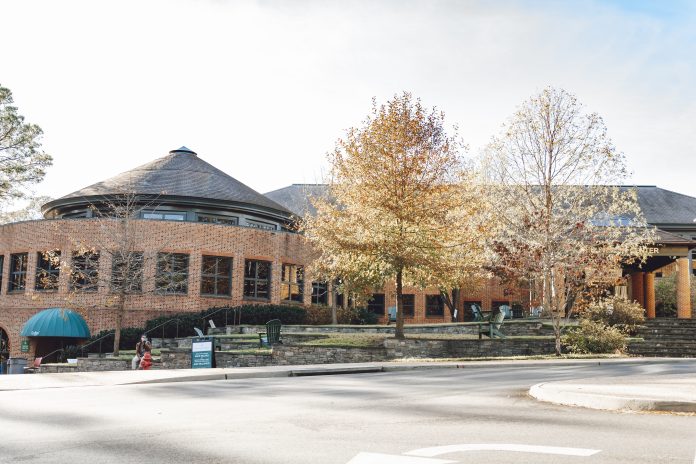Wednesday, Nov. 13, the Center for Student Diversity hosted a screening of the documentary “Warrior Lawyers: Defenders of Social Justice” followed by a panel discussion. The documentary’s executive producer Audrey Geyer, Chief Justice of the High Court Melissa Holds the Enemy of the Upper Mattaponi Tribe of King William, teaching professor of anthropology and director of American Indian Resource Center Dr. Danielle Moretti-Langholtz and assistant professor of anthropology Buck Woodward served as the panelists.
The event was hosted in collaboration with the College’s departments of Strategic Cultural Partnerships and Student Accountability and Restorative Practices.
The documentary focused on the stories of tribal judges, Native American lawyers hailing from Michigan and others working within the legal framework of indigenous communities to promote sacred justice.
Interim Director of the Center for Student Diversity Monique Williams delivered introductory remarks, highlighting the importance of Native American Heritage Month and studying Native American histories.
“It is no secret to anyone in my office that curiosity is one of my favorite William and Mary values and is the core of what drives our work in our center,” Williams said. “It is also why we gather here today to celebrate Native American Heritage Month and to honor the traditions, languages, stories and resilience of Native American communities and to ensure their rich histories and contributions continue to thrive with each passing generation.”
Masters student at the Batten School of Coastal and Marine Sciences Jack Hatch ’22 recited the land acknowledgment and introduced the PBS documentary.
“The program focuses on stories of Native American lawyers, tribal judges and their colleagues who work with Native nations, their citizens and mainstream institutions to achieve healing and sacred justice,” Hatch said. “These unseen role models strive daily to address, repair and resolve unique, complicated historical, governmental, legal, judicial and social welfare issues which are most often rooted in discrimination, historical trauma and cultural destruction.”
After the screening, Administrative Coordinator for Strategic Cultural Partnerships Margaret Morrison moderated the panel. Morrison first asked the panelists to share how the documentary resonated with them and its connection to their work.
Moretti-Langholtz reflected on how the crucial work done across Michigan as shown in the film has been difficult to replicate in Virginia due to legal barriers.
“Tribes east of the Mississippi have been left out of so much important work that we saw in this film because of their lack of federal recognition until recently,” Moretti-Langholtz said.
She emphasized that federal recognition is needed to grant tribal court jurisdiction and see restorative justice in action.
Holds the Enemy touched on how the tribal sovereignty demonstrated in the film makes her hopeful for a future where all native people and governments have true sovereignty.
“This is a true assertion of sovereignty for a tribal nation to put a court in place,” she said. “If there was ever a demonstration of tribal sovereignty, this is what it is. This is a prime example, having a court in place where that tribal nation, those people have that venue available to them, because as tribal people we’ve grown up already within a society where we’ve been told, ‘You’re not up here, you’re down here, you come later. Your issues aren’t ours.’”
Geyer expressed how eye-opening producing the documentary was.
“The more I learn and the more I interview, the more I realize how little I still know,” Geyer said. “That’s really one of the main reasons why I decided as a non-native person to do these documentaries, because a couple of times during my life it struck me how little I knew about Native American history and contemporary issues facing tribal communities and Native American citizens.”
Ari Pearlstein ’26 asked the panelists about the current status of the Indian Child Welfare Act in light of recent Supreme Court rulings. ICWA is a 1978 federal law that protects native children and centers tribal court jurisdiction and sovereignty.
Geyer explained the current status of ICWA and fears surrounding the ruling.
“It was challenged, brought to the Supreme Court,” Geyer said. “And some of the Native American attorneys in the documentary voiced their concerns about, is it going to be shut down, declared unconstitutional? So there was a lot of fear and concern. And luckily, it wasn’t. I mean especially in the light of such a conservative court.”
Holds the Enemy emphasized the constant battle Native Americans and tribal courts have to fight to maintain their sovereignty.
“At what time for Indian tribes are we never being attacked? It’s common sense. We’re at a point as Indian people where it’s second nature for something of ours to try to be attacked,” she said.
Holds the Enemy shared that tribes always have to be ready to defend their rights and property.
“We just have to be prepared and always on guard because if it’s not ICWA, it’s natural resources,” she said. “If it’s not our natural resources, it’s our economic development.”
Williams concluded the event by posing an open-ended question: How can students be defenders of sacred justice?
Woodward encouraged students to take classes focused on Native American history and culture as a first step toward defending sacred justice.
“I think it’s important to recognize that William and Mary has created a Native Studies minor,” Woodward said. “It’s just a few years old, but those courses are available and we teach them every semester and across the disciplines: American studies, biology, history. And we would encourage students to take some of those classes and to not be scared. The only way that we can move forward for the future and be that good citizen is to become educated and informed.”
Holds the Enemy also encouraged students to learn about local native history.
“You’re pretty lucky in Virginia because that history is there,” she said. “Make an effort and learn about these tribes. Pick one and then go with it.”

